Minnesota is known as the Land of 10,000 Lakes—the beauty of the terrain thrills visitors—but the beauty comes with danger. Reverend S. B. Shaw tells of a farmer who lived on the edge of one of those lakes. One evening after sunset he was on the water when a sudden gust capsized his sailboat. The man tried to swim for shore; but the water was frigid with ice. He was stunned by the cold; and in his confusion he swam toward the middle of the lake. Just as he was about to succumb to an icy death, he heard a voice crying in the distance, “Father! Father!”
The man’s spirits revived. He couldn’t tell where the words had come from, but he thought, “If only she would call again, I think I could tell which way to go.” Just then another call sounded through the darkness: “Father!”
“I turned and struck out in the opposite direction,” the man later recalled. “I had been going away from home. I fought my way … reached the shore and home at last. But if my dear little girl had not persisted in calling me, though hearing no reply, I would have died there alone under the ice.”[1]
Many people around us are losing their balance and missing the way. It’s the sound of our voice—our words spoken in Jesus’ name—that can become the means of their salvation.
The Bible says, “For ‘whoever calls on the name of the LORD shall be saved.’ How then shall they call on Him in whom they have not believed? And how shall they believe in Him of whom they have not heard? And how shall they hear without a preacher?” (Romans 10:13-14)
In the Old Testament, a wide variety of characters proclaimed the message including angels, priests, judges, poets, and prophets. In the New Testament, the most effective “preachers” were fishermen and tentmakers. The apostles were “uneducated and untrained men . . . (who) had been with Jesus” (Acts 4:13). Peter put it well when he said: “We cannot but speak the things which we have seen and heard” (Acts 4:20).
The Purpose of Proclaiming God’s Word
There is someone we can reach for Christ if we have the same attitude. People need the Lord presently in this life, but how much greater is their eternal need! The subjects of the wrath and judgment of God are often neglected, like a library book that hasn’t been checked out in years. But the Bible still says, “It is a fearful thing to fall into the hands of the living God” (Hebrews 10:31) and it still says, “Prepare to meet your God” (Amos 4:12).
Were we to spend five minutes in contemplation of an eternity without Christ, we’d be much more zealous in proclaiming the Gospel. Our purpose, like that of our Lord, is to seek and to save the lost. Just as His love compelled Christ to die for the world, His love in us compels us to tell the world of His redeeming death.
The Process of Proclaiming God’s Word
If the thought of proclaiming the Word seems daunting, remember that it’s a team effort, coordinated by the Holy Spirit. The apostle Paul explained it like this: “I planted, Apollos watered, but God gave the increase. So then neither he who plants is anything, nor he who waters, but God who gives the increase” (1 Corinthians 3:6-7).
If you see a man or woman step forward to follow Christ, you rejoice! But remember, when we see a harvest, it’s only because others have already done a lot of planting and watering.
If we don’t see immediate results, leave that in God’s hands. It often takes multiple contacts with the Gospel before a person chooses Christ as Savior. God’s Word doesn’t return void, and in the end we’ll reap a harvest if we don’t give up.
The Power of Proclaiming God’s Word
Remember that the power of the Gospel doesn’t reside in our personality or powers of persuasion. The power is in the Gospel itself. The apostle Paul wrote, “For I am not ashamed of the gospel of Christ, for it is the power of God to salvation for everyone who believes” (Romans 1:16).
If you can quote John 3:16 or Romans 6:23, you can witness. You can proclaim the word by saying something as simple as “I once was blind but now I see.”
###
Dr. Jeremiah is the founder of Turning Point for God, and serves as Senior Pastor of Shadow Mountain Community Church in El Cajon, California.
For more information about Turning Point, go to www.DavidJeremiah.org





